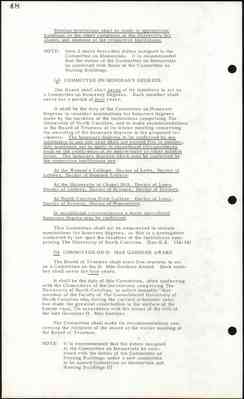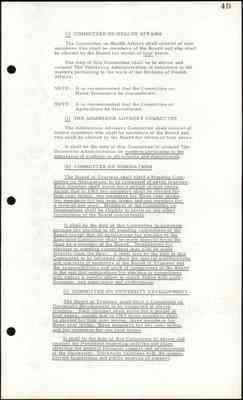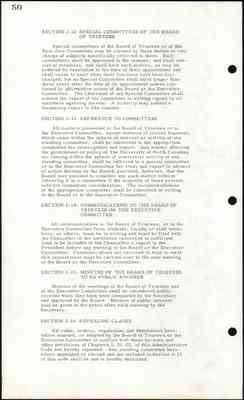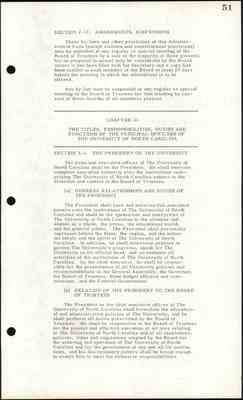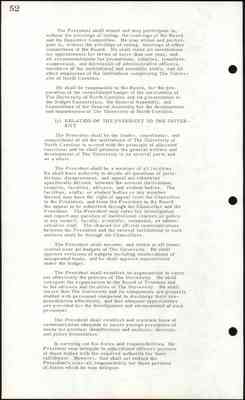Pages
48
Similar provisions shall be made in appropriate buildings on the other campuses of the University for alumni and alumnae of the respective institutions.
NOTE: Item 2 above describes duties assigned to the Committee on Memorials. It is recommended that the duties of the Committee on Memorials be combined with those of the Committee on Naming Buildings.
(g) COMMITTEE ON HONORARY DEGREES
The Board shall elect seven of its members to act as a Committee on Honorary Degrees. Each member shall serve for a period of four years.
It shall be the duty of the Committee on Honorary Degrees to consider nominations for honorary degrees made by the faculties of the institutions comprising The University of North Carolina, and to make recommendations to the Board of Trustees at its winter meeting concerning the awarding of the honorary degrees to the proposed recipients. The honorary degrees to be conferred by any institution in any one year shall not exceed five in number, this maximum not to apply in exceptional circumstances such as the celebration of an anniversary or other notable event. The honorary degrees which may be conferred by the respective institutions are:
At the Woman's College: Doctor of Laws, Doctor of Letters, Doctor of Humane Letters.
At the University at Chapel Hill: Doctor of Laws, Doctor of Letters, Doctor of Science, Doctor of Divinity.
At North Carolina State College: Doctor of Laws, Doctor of Science, Doctor of Humanities.
In exceptional circumstances a more specialized honorary degree may be conferred.
This Committee shall not be empowered to initiate nominations for honorary degrees, as this is a prerogative conferred by law upon the faculties of the institutions comprising The University of North Carolina. (See G.S. 116-16)
(h) COMMITTEE ON O. MAX GARDNER AWARD
The Board of Trustees shall elect five trustees to act as a Committee on the O. Max Gardner Award. Each member shall serve for four years.
It shall be the duty of this Committee, after conferring with the Chancellors of the institutions comprising The University of North Carolina, to select annually "that member of the faculty of The Consolidated University of North Carolina who, during the current scholastic year, has made the greatest contribution to the welfare of the human race," in accordance with the terms of the will of the late Governor O. Max Gardner.
The Committee shall make its recommendations concerning the recipient of the award at the winter meeting of the Board of Trustees.
NOTE: It is recommended that the duties assigned to the Committee on Memorials be combined with the duties of the Committee on Naming Buildings under a new committee to be named Committee on Memorials and Naming Buildings (f).
49
(i) COMMITTEE ON HEALTH AFFAIRS
The Committee on Health Affairs shall consist of nine members who shall be members of the Board and who shall be elected by the Board for terms of four years.
The duty of this Committee shall be to advise and counsel The University Administration in reference to all matters pertaining to the work of the Division of Health Affairs.
NOTE: It is recommended that the Committee on Home Economics be discontinued.
NOTE: It is recommended that the Committee on Agriculture be discontinued.
(j) THE ADMISSIONS ADVISORY COMMITTEE
The Admissions Advisory Committee shall consist of twelve members who shall be members of the Board and who shall be elected by the Board for terms of four years.
It shall be the duty of this Committee to counsel The University Administration on matters pertaining to the admission of students in all schools and departments.
(k) COMMITTEE ON NOMINATIONS
The Board of Trustees shall elect a Standing Committee on Nominations to be composed of seven trustees. Each member shall serve for a period of four years, except that in 1963 two members shall be elected for four year terms, two members for three year terms, two members for two year terms and one member for a term of one year. Members of the Committee on Nominations shall be eligible to serve on any other committees of the Board concurrently.
It shall be the duty of this Committee to nominate persons for election to all standing committees of the Board except that all nominations for election to the Executive Committee shall be made directly from the floor by a member of the Board. Nominations for election to standing committees may also be made directly from the floor. It shall also be the duty of this Committee to be informed about the special qualifications and interests of members of the Board of Trustees and the responsibilities and work of committees of the Board to the end that nominations for election to committees will reflect a careful effort to match duties with qualifications, and experience and preferences.
(l) COMMITTEE ON UNIVERSITY DEVELOPMENT
The Board of Trustees shall elect a Committee on University Development to be composed of eleven trustees. Each member shall serve for a period of four years, except that in 1963 three members shall be elected for four year terms, three members for three year terms, three members for two year terms, and two members for one year terms.
It shall be the duty of this Committee to advise and counsel the President regarding policies and plans affecting the general financial support and advancement of the University, University relations with the alumni, private foundations and public sources of support.
50
SECTION 2-12 SPECIAL COMMITTEES OF THE BOARD OF TRUSTEES
Special committees of the Board of Trustees or of the Executive Committee may be created by these bodies to take charge of subjects specifically referred to them. Such committees shall be appointed in the manner, and shall consist of members, and shall have such powers, as may be ordered by resolution at the time of their appointment and shall cease to exist when their functions have been discharged; but no Special Committee shall exist longer than three years after the date of its appointment unless continued by affirmative action of the Board or the Executive Committee. The Chairman of any Special Committee shall submit the report of his committee in writing signed by all members agreeing thereto. A minority may submit a dissenting report in like manner.
SECTION 2-12 REFERENCE TO COMMITTEES
All matters presented to the Board of Trustees or to the Executive Committee, except matters of routine business, which come within the sphere of interest or activity of any standing committee, shall be submitted to the appropriate committee for investigation and report. Any matter affecting the government or policy of The University of North Carolina not coming within the sphere of interest or activity of any standing committee, shall be referred to a special committee or to the Executive Committee for study and report in advance of action thereon by the Board; provided, however, that the Board may proceed to consider any such matter without referring it to a committee if the majority of those present vote for immediate consideration. The recommendations of the appropriate committee shall be submitted in writing to the Board or to the Executive Committee.
SECTION 2-14. COMMUNICATIONS TO THE BOARD OF TRUSTEES OR THE EXECUTIVE COMMITTEE
All communications to the Board of Trustees, or to the Executive Committee from students, faculty or staff members, or others, must be in writing and must be filed with the Chancellor of the institution concerned in sufficient time to be included in the Chancellor's report to the President before any meeting of the Board or the Executive Committee. Communications not received in time to meet this requirement must be carried over to the next meeting of the Board or the Executive Committee.
SECTION 2-15. MINUTES OF THE BOARD OF TRUSTEES TO BE PUBLIC RECORDS
Minutes of the meetings of the Board of Trustees and of the Executive Committee shall be considered public records when they have been completed by the Secretary and approved by the Board. Matters of public interest may be given to the press after each meeting by the Secretary.
SECTION 2-16 REPEALING CLAUSE
All rules, orders, regulations and resolutions heretofore enacted, or adopted by the Board of Trustees or the Executive Committee in conflict with these by-laws and other provisions of Chapters I, II, III, of this Administrative Code are hereby repealed. Any standing committee heretofore appointed or elected and not included in Section 2-11 of this code shall be and is hereby abolished.
51
SECTION 2-17. AMENDMENTS, SUSPENSIONS
These by-laws and other provisions of this Administrative Code (except statutes and constitutional provisions) may be amended at any regular or special meeting of the Board of Trustees by a vote of the majority of those present; but no proposal to amend may be considered by the Board unless it has been filed with the Secretary and a copy has been mailed to each member of the Board at least 10 days before the meeting in which the amendment is to be offered.
Any by-law may be suspended at any regular or special meeting of the Board of Trustees for that meeting by consent of three-fourths of all members present.
CHAPTER III THE TITLES, RESPONSIBILITIES, DUTIES AND FUNCTIONS OF THE PRINCIPAL OFFICERS OF THE UNIVERSITY OF NORTH CAROLINA
SECTION 3-1. THE PRESIDENT OF THE UNIVERSITY
The principal executive officer of The University of North Carolina shall be the President. He shall exercise complete executive authority over the institutions comprising The University of North Carolina subject to the direction and control of the Board of Trustees.
(a) GENERAL RELATIONSHIPS AND DUTIES OF THE PRESIDENT
The President shall have and exercise full executive powers over the institutions of The University of North Carolina and shall be the spokesman and interpreter of The University of North Carolina to the alumnae and alumni as a whole, the press, the educational world, and the general public. The President shall personally represent before the State, the region, and the nation the ideals and the spirit of The University of North Carolina. In addition, he shall determine policies to govern The University's programs, speak for The University as its official head, and co-ordinate all activities of the institutions of The University of North Carolina. As the chief executive, he shall be responsible for the presentation of all University policies and recommendations to the General Assembly, the Governor, the Board of Trustees, State budget officers and commissions, and the Federal Government.
(b) RELATION OF THE PRESIDENT TO THE BOARD OF TRUSTEES
The President as the chief executive officer of The University of North Carolina shall formulate the educational and administrative policies of The University, and he shall perform all duties prescribed by the Board of Trustees. He shall be responsible to the Board of Trustees for the prompt and effective execution of all laws relating to The University of North Carolina and of all resolutions, policies, rules and regulations adopted by the Board for the ordering and operation of The University of North Carolina and for the government of any and all its institutions, and his discretionary powers shall be broad enough to enable him to meet his extensive responsibilities.
52
The President shall attend and may participate in, without the privilege of voting, the meetings of the Board and its Executive Committee. He may attend and participate in, without the privilege of voting, meetings of other committees of the Board. He shall make all nominations for appointments for terms of more than one year, and all recommendations for promotions, salaries, transfers, suspensions, and dismissals of administrative officers, members of the institutional and scientific staffs, and all other employees of the institutions comprising The University of North Carolina.
He shall be responsible to the Board, for the preparation of the consolidated budget of the institutions of The University of North Carolina and its presentation to the Budget Commission, the General Assembly, and Committees of the General Assembly for the development and maintenance of The University of North Carolina.
(c) RELATION OF THE PRESIDENT TO THE UNIVERSITY
The President shall be the leader, coordinator, and consolidator of all the institutions of The University of North Carolina in accord with the principle of allocated functions; and he shall promote the general welfare and development of The University in its several parts and as a whole.
The President shall be a member of all faculties. He shall have authority to decide all questions of jurisdiction, disagreement, and appeal not otherwise specifically defined, between the several institutions, councils, faculties, officers, and student bodies. The faculties, staffs, or student bodies or any member thereof may have the right of appeal from the Chancellor to the President, and from the President to the Board, the appeal to be submitted through the Chancellor and the President. The President may refer for investigation and report any question of institutional concern or policy to any council, faculty, scientific, extension, or administrative staff. The channel for official communications between the President and the several institutions in such matters shall be through the Chancellors.
The President shall assume, and retain at all times, control over all budgets of The University. He shall approve revisions of budgets including reallocations of unexpended funds, and he shall approve expenditures under the budget.
The President shall establish an organization to carry out effectively the policies of The University. He shall interpret the organization to the Board of Trustees and to the officers and faculties of The University. He shall insure that The University and its components are properly staffed with personnel competent to discharge their responsibilities effectively, and that adequate opportunities are provided for the development and advancement of such personnel.
The President shall establish and maintain lines of communication adequate to insure prompt perception of needs for problem identification and analysis, decision, and policy formulation.
In carrying out his duties and responsibilities, the President may delegate to subordinate officers portions of those duties with the required authority for their fulfillment However, this shall not reduce the President's over-all responsibility for those portions of duties which he may delegate.
